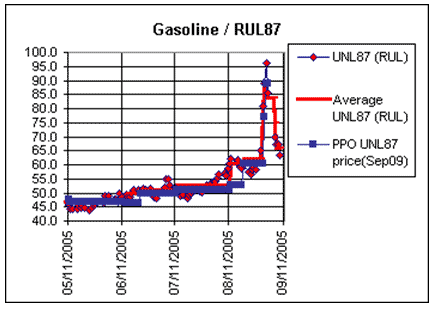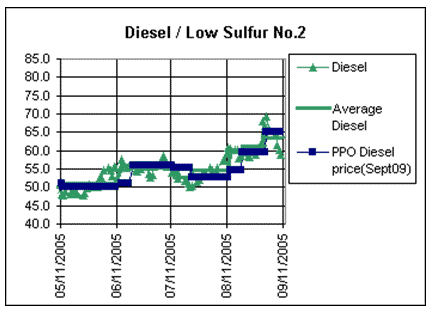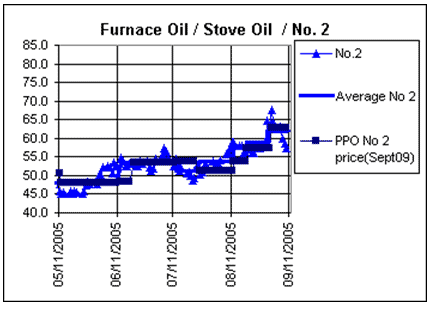NLIS 2
September 15, 2005
(Government Services)
The following is being distributed at the
request of the Public Utilities Board�s Petroleum Pricing Office (PPO):
Prices decreased for diesel fuel,
furnace/stove oil
Effective 12:01 a.m. Thursday, September 15,
2005, the Public Utilities Board�s Petroleum Pricing Office (PPO) will make its
regularly scheduled pricing adjustment for regulated fuels, except gasoline, in
Newfoundland and Labrador (NL).
On the heels of the PPO recently announcing a decrease of 10.4 cents per litre (cpl)
in maximum gasoline prices on Tuesday, September 13, distillate fuels will now
see a decline in their maximum prices effective Thursday, September 15: diesel
by 2.0 cpl and furnace/stove oil prices by 1.07 cpl. In the meantime,
residential propane used for home heating purposes (which was last adjusted
August 15) will increase by 3.5 cpl.
Over the past several weeks, following an extraordinary period of fuel-price
volatility on the New York Mercantile Exchange (NYMEX) resulting in prices
spiking at record levels, subsequent declines in world market prices for refined
fuels have translated into decreases in maximum prices for most regulated fuels
in Newfoundland and Labrador.
On Tuesday, September 13, the board initiated an early adjustment of 10.4 cents
per litre (cpl) in the maximum price of gasoline. This early response was to
accommodate a significant price decrease on behalf of consumers comparable to
the immediate action taken by the board to raise prices in the face of industry
concerns regarding fuel shortages and continuity of oil supplies arising from
Hurricane Katrina. The prices for the remaining regulated fuels are now being
adjusted in accordance with the board�s normal practice on the 15th of the
month.
David Toms, PPO director (acting), said: �Reports of damage to infrastructure
from Hurricane Katrina had a major effect on the commodity markets with
uncertainty and speculation resulting in the significant spiking of prices.
However, commodity prices have since retreated from record highs, but some
impact from this disaster may be persistent in the market in the near future and
for some time afterward. Fuel prices remain far from settled on an international
level, and this situation will influence pricing in NL, in accordance with the
Petroleum Products Act.�
The board will continue to monitor all extraordinary events impacting prices for
petroleum products in Newfoundland and Labrador and take whatever action is
necessary in the interest of all stakeholders. It is the board�s intent,
however, at the earliest opportunity, to return to the normal process of
adjusting prices, including gasoline, on the 15th of each month and using the
interruption formula for interim adjustments as justified.
BACKGROUNDER
Assisting to relieve market prices for refined
fuels has been the gradual recovery of oil production and refineries (10 per
cent of U.S. refining capacity was shut down) from the devastation of Hurricane
Katrina (the largest disruption to supplies since 2003) in the Gulf of Mexico -
a significant fuel source to the U.S.
As well, the commodities market during this pricing period was receptive to the
news that inventory figures, released by the U.S. Energy Information
Administration (EIA) September 7, had declined less than expected in the wake of
the hurricane�s damage.
There has been a concerted effort from agencies, such as International Energy
Agency (IEA) members, to release oil, gasoline and other refined products to the
market to ease shortages. The U.S. Strategic Petroleum Reserve (an emergency
cache of crude oil used to offset any interruption in petroleum supplies) was
also set to release additional oil to the market. However, whether or not the
available crude feedstock can be processed to sufficiently meet demands for
products will be a key factor in future commodity pricing.
The IEA recently forecasted that the impact of Hurricane Katrina was expected to
cut fuel consumption in the U.S., while global demand growth in 2005 was
weakening as usage slows in high-consumption areas, including China and
industrialized nations. This placed a downward market pressure on refined fuels.
The board adjusts fuel prices on the 15th of each month using the average daily
prices for finished petroleum products as listed on NYMEX (New York Mercantile
Exchange). Illustrated in the following four graphs are the market-price
performances of the products regulated by the PPO for recent regularly scheduled
pricing periods up to September 9, 2005:




1. Automotive Fuels � Maximum Retail Pump Prices � Effective September 15, 2005
2. Heating Fuels � Maximum Tank Wagon (or ** Tank Farm) Prices � Effective
September 15, 2005
3. Heating Fuels � Residential Propane � Maximum Tank Wagon Prices � Effective
September 15, 2005.
Media contact: Michelle Hicks, Communications, 1-866-489-8800, (709) 489-8837
2005 09 15
9:50 a.m.
|








